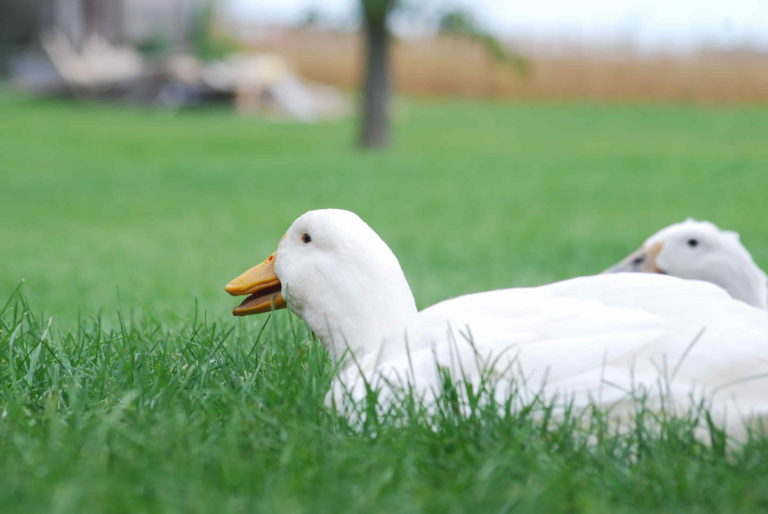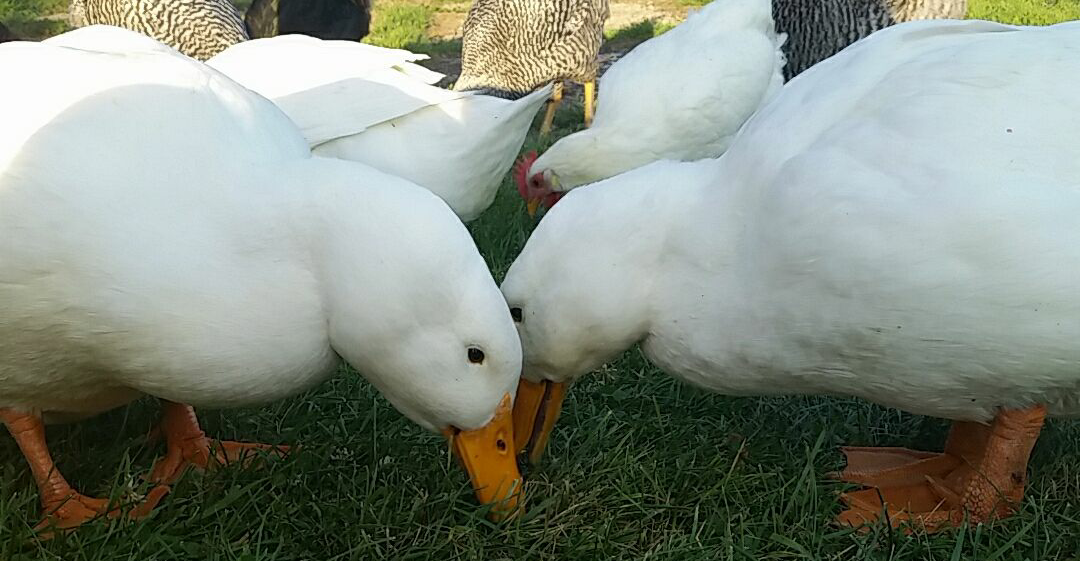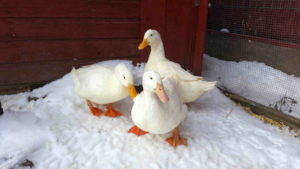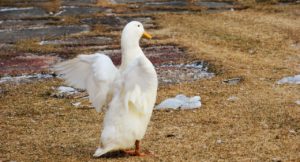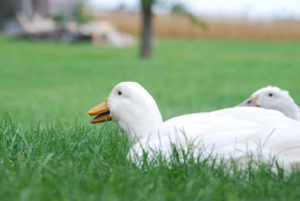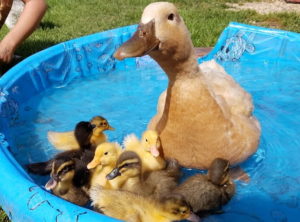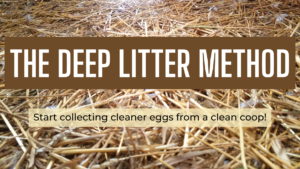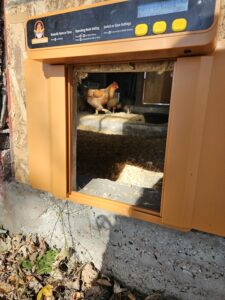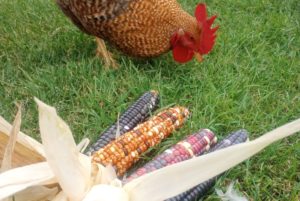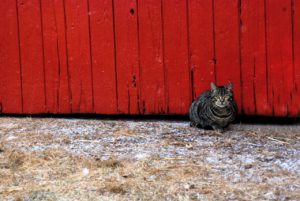Table of Contents
Most everyone knows that poultry are “gateway animals” into the livestock world. And this is for good reason!
Poultry are easy to care for, provide great food, and require a very low initial investment.
But when it comes to poultry, how do you know what kind to get? Chickens and ducks are two of the most popular and versatile kinds of domestic poultry. They’re robust, adaptable, and very productive. But both species have their ups and downs.
Keep reading to learn all the differences between chickens and ducks to help you choose the perfect poultry.
Space
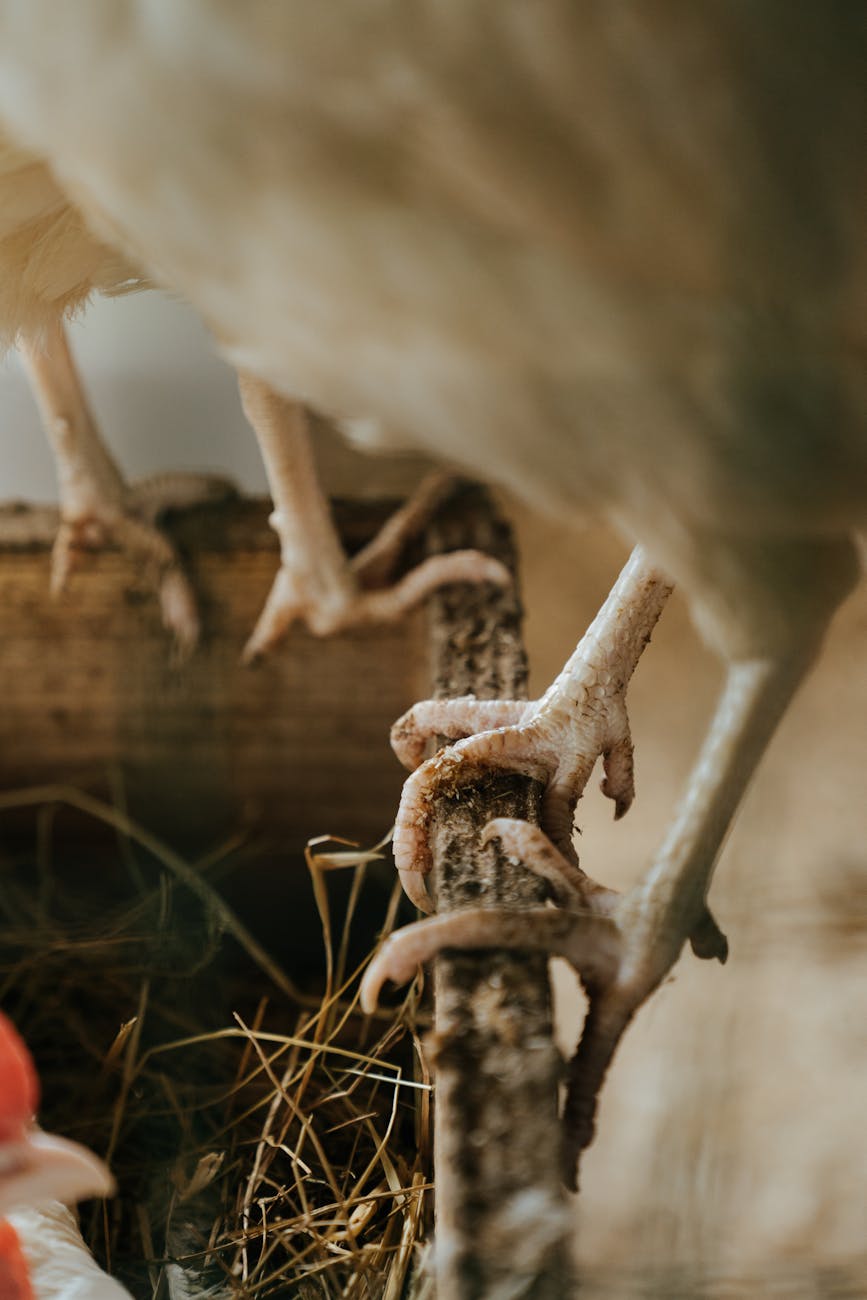
Foot for foot, ducks and chickens have very similar requirements – each adult bird will chicken needs 18 inches on the roosting bar and adult ducks need 3-4 feet of sleeping space in the coop.
And both ducks and chickens will take full advantage of all the outdoor space you can give them.
It is recommended to have a minimum of 100 square feet of outdoor space per bird. This will give the birds enough space to spread out away from each other and get some exercise.
Tip: Make the most of your coop by using the Deep Litter Method!
Sleeping Habits
You’ve probably seen pictures of chickens sleeping on roosting bars and wondered if ducks do that too.
Sorry to say that ducks don’t roost at night… though it would be hilarious to see a fluffy duck trying to balance on a roosting bar!
The benefit to chickens roosting is that they don’t sleep where they lay eggs. Chickens rarely sleep (or poop) in nesting boxes, so their eggs stay very clean! On the other hand, ducks tend to lay and sleep in the same spots and their nests are dirtier.
Weather Hardiness
One of the most challenging aspects of owning any livestock is managing them in all weather conditions. And when it comes to poultry, ducks are the hardiest.
Because of the physiological differences between chickens and ducks, ducks can withstand colder, wetter conditions than chickens. Unlike chickens, ducks’ feathers are waterproof and keep them warm and toasty whatever the weather!
Most chickens are comfortable down to about 40 ⁰F while ducks are comfortable down to about 20 ⁰F degrees without shelter.
Additionally, ducks are well suited to withstand wet or humid conditions while chickens tend to get chilled.
Besides being better suited for it, ducks also love rain. Ducks thoroughly enjoy dabbling around in muddy puddles and hunting for waterlogged worms.
Over the years, I’ve also noticed that ducks do better with snow. My chickens stayed indoors most of the winter and avoided the snow. On the other hand, ducks don’t seem to mind a few inches of snow – and some even enjoy wading and rooting around in it.
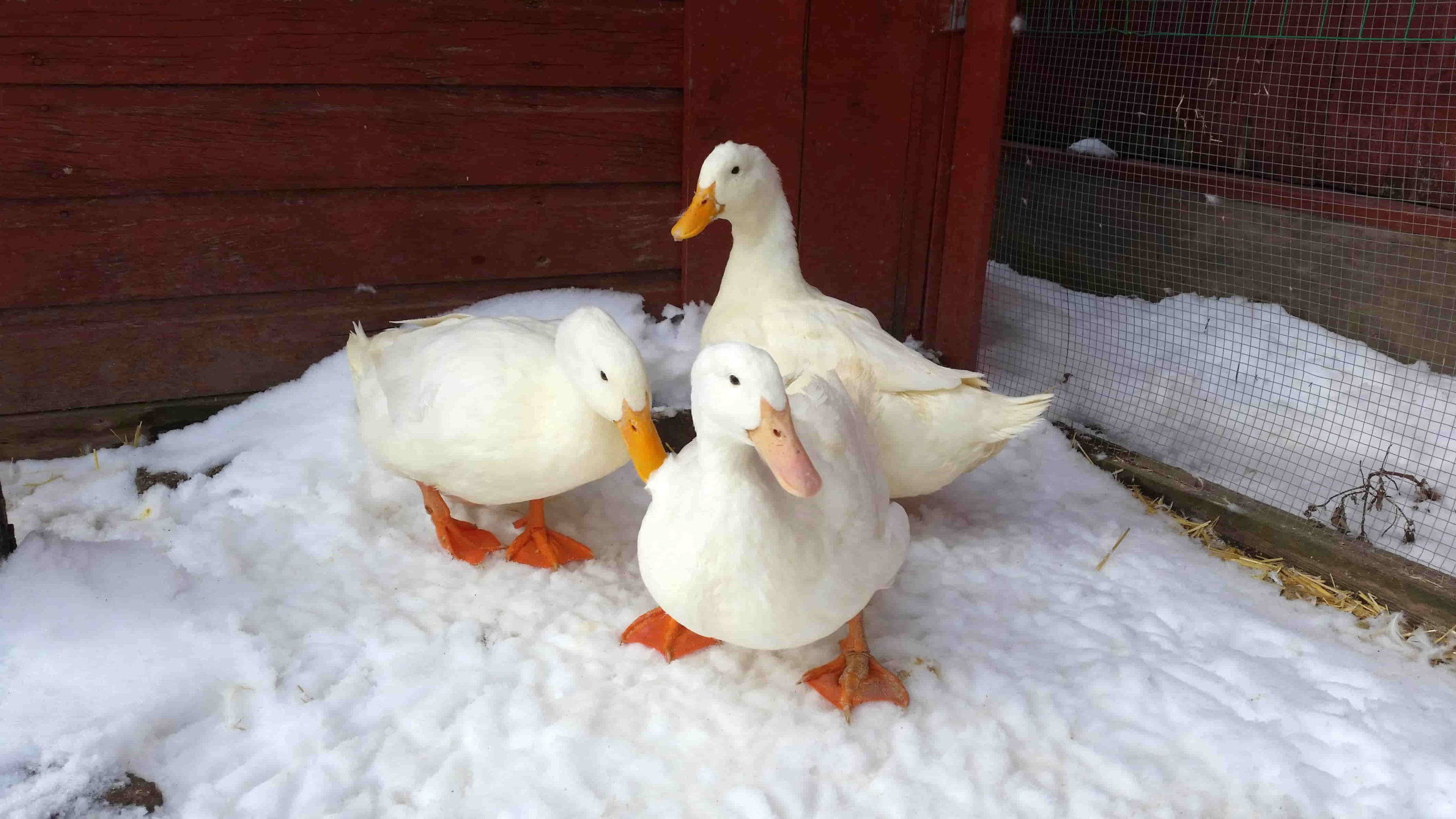
Noise
If you live near your neighbors, one particularly important trait to consider is the noise your birds will make.
While both ducks and chickens can get noisy, chickens are easier to keep quiet. To keep a quiet flock of chickens, all you need to do is avoid keeping roosters. A flock of happy hens will be nearly silent. It’s usually just roosters that will wake the neighbors.
On the other hand, ducks of both sexes will loudly vocalize day and night. Unlike chicken hens, duck hens tend to be the louder ones.
That said, there are some breeds of ducks that are quieter than others. Some good neighbor-friendly ducks are Muscovy and call ducks.
Fun Fact! Muscovy ducks are the only domestic ducks not descended from Mallards. Unlike other ducks, Muscovy’s are descended from the native jungle birds of Mexico and South America. Because of this, these birds rarely sound off a loud quack, and they instead make quieter cooing or croaking noises.
Egg Production
Another important consideration is productivity. Luckily for us poultry owners, the differences between chickens’ and ducks’ laying ability are slight; so, you’re free to choose whatever bird is your favorite.
Ducks and chickens are nearly on par with each other for egg production. Layer chickens tend to lay about 80 more eggs per year than layer ducks.
With hundreds of duck and chicken breeds to choose from, there are great layers from both teams!
Some great egg-laying chicken breeds are Barred Rock, Australorp, Wyandotte varieties, and Leghorns. All these breeds can easily lay more than 200 eggs per year, some up to 280 and beyond.
Some great egg-laying ducks are Khaki Campbell, White Layers, Muscovy, and Golden 300 Hybrid Layers. On average, these breeds will lay around 200 eggs per year.
These are only a handful of duck and chicken breeds – there are hundreds of amazing breeds for you to discover!
But even though ducks lay slightly fewer eggs, I think ducks are the superior egg-laying bird for homesteads. Ducks lay larger eggs, are hardier, and I’ve noticed that ducks lay more consistently throughout the year.
Chicken laying usually experiences a dramatic drop during Winter. Ducks, however, will usually lay through the year with just a small dip in production during the darkest weeks of Winter.
An average large chicken egg weighs about 53 grams, but my ducks’ eggs have consistently been at least 75-80 grams.
In addition to being larger, duck eggs are also higher in important nutrients like iron, vitamin A, protein, and calcium.
| Nutrient | ||||
| Calcium | Vitamin A | Protein | Iron | |
| Duck Egg | 3.4% RDV | 9.4% RDV | 9 grams | 21% RDV |
| Chicken Egg | 2% RDV | 8% RDV | 7 grams | 10% RDV |
RDV = Recommended Daily Value (as described by the FDA)
Meat Production
As for meat production, it’s honestly up to preference!
Duck meat is 100% dark meat and tends to be fattier than chicken. Some people find that the higher fat content in duck upsets their stomachs. Personally, I’ve never had an upset stomach from duck meat and enjoy the taste!
Chicken meat, as most people know is a lean protein with both dark and light meat.
Heavyweight duck breeds usually weigh between 9 and 13 pounds, which is larger than most chicken breeds. However, some chickens, like Jersey Giants, can reach that same size.
A few great meat duck breeds are Pekin, Rouen, Muscovy, and Aylesbury.
The most popular meat chicken breeds are Jersey Giants and Cornish Cross.
Each of these breeds will take different lengths of time to grow to market weight, so make sure to do research on your chosen breed.
Having dedicated meat chickens is great, but many modern meat breeds are hybrids that grow extremely fast which makes them prone to mobility issues. These breeds also have severe difficulty reproducing naturally due to their size.
That’s why I recommend raising multipurpose or heritage chicken breeds. These chickens will take longer than modern meat breeds to reach market weight, but are great at foraging, easy to breed, have long lifespans, and lay a respectable number of eggs to boot.
If you don’t have space for separate flocks of meat and egg birds, consider a multipurpose breed that can be butchered at 16 weeks or retained as layers.
Some multipurpose heritage chicken breeds are Plymouth Rock, Australorp, and Red Rangers.
Discover more multipurpose breeds here.
A few multipurpose duck breeds are Muscovy, Pekin, and Buff ducks.
Foraging & Pest Control
If you’ve heard that chickens are fantastic for pest control, you heard right. Chickens are well known for their ability to hunt ticks, maggots, flies, and garden pests.
Ducks can be good at this too! Larger meat ducks tend to be a bit less inclined to forage. But any bird will try foraging if given the opportunity. To maximize your ducks’ foraging ability, consider Muscovy, Mallard, Khaki Campbell, or Appleyard ducks.
Ready to take home your first ducks? Do it right by avoiding these common duck care mistakes!
Herding & Flock Management
Have you ever heard a saying about trying to herd cats? Herding chickens is much the same.
When you try to herd chickens, they scatter and run in all different directions. Unless there’s some sort of food incentive or a lot of people to help, it’s almost impossible to move a flock of chickens where you want them to go.
This is one area where ducks shine. During herding, ducks will flock together and usually move as a group in the right direction. I guess getting you ducks in a row is easier than we thought… 😉.
Ducklings are a different story though. I vividly remember struggling to herd my first pekin ducklings into their coop one afternoon. I had ducklings running in and out the coop and under my car. I imagine my neighbors had quite an entertaining view that day.
Personal Preference
Aside from all the facts, we can’t discount our preferences.
You’ll enjoy your poultry journey much more if you like the birds that you own. For some, it comes down to looks or temperament or fond childhood memories.
I’m a mixture of both – I love ducks because I grew up raising them and they’re adorable. But I also enjoy chickens because of their value as working farm and food animals.
Make sure you choose a poultry breed that meets your needs and that you’ll be happy to own.
There you have it, an in-depth comparison between ducks and chickens to help you decide who your next feathered friends are going to be. I hope you found this article helpful and… happy homesteading!
My favorite duck breeds are Welsh Harlequin and Muscovy. I’d love to know what your favorite poultry breeds are! Let me know down in the comments!
Learn everything you need to know about taking care of ducklings with my free guide to duckling care.

